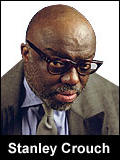
New York Daily News - News & Views Columnists - Stanley Crouch: Simply, the bestSimply, the best
Joyce Wein's life & death area model for all of us to follow
Joyce Alexander Wein, wife of jazz impresario George Wein, was laid to rest last week in New York at a very unusual funeral. What one comes to expect at a funeral for someone connected to jazz is a lot self-aggrandizement in which the speakers reveal more about their obsessions than they do about the one considered the dearly departed.
This was so different that it seemed a high point in the culture of our time because the ceremony and the speakers gave vent to their affection for a black woman who was so far outside the stereotypes that burden the educated, the middle class and the sophisticated black people who rise to positions of authority or prominence. They are too often considered inauthentic unless they cannot speak the English language or seem no more sophisticated than a badly cooked pot of chitlins or some low-grade corn bread.
Born in 1928, Joyce Alexander Wein was from the black middle class of Boston. When she married her Jewish husband in 1959, he was the one who rose socially and developed layers of taste and understanding from her, which is so often reversed in the conventional tale of the Jewish guy who marries the black woman and educates her in the finer things of life.
Joyce Alexander had graduated from high school at 15 and from college as a chemistry major four years later. She loved literature, knew much about painting and was not a woman who suffered either the limited expectations or the racism of her time in silence. As is traditional at jazz funerals, there was a level of integration that we see too little of when great souls are lost in the worlds of literature, dance, theater, concert music and film. As one person pointed out, the gathering was integrated in the way that Joyce Wein's personality and intellect were integrated. She was everything that she liked - the joy and variety of jazz, the sweep of literature, the craft of painting, the nuance of cuisine, the discipline common to all people of achievement, the dignity of the species and the great sense of humor that we Americans all know in our very special way.
Jazz has always celebrated the individual at the same time as it ultimately values group cooperation, and it has been on the front line of integration in the most important ways. In the world of jazz, one gets recognition not for one's color or background but for what one can create alone and in combination with others.
Joyce Alexander Wein represented the best of jazz and the best of American womanhood because she never took a backseat to anyone. She sat in the front and brought as many people to the first row as she could whenever she could. That was her greatness, and that was what she stood for, because she believed much more in fairness than in favors. She was a model for our nation.
Originally published on August 21, 2005
No comments:
Post a Comment